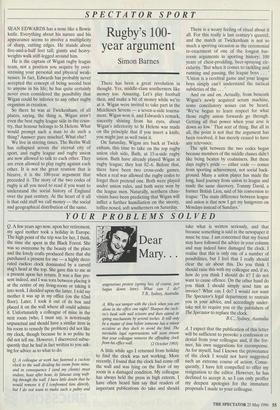SPECTATOR SPORT
SEAN EDWARDS has a nose like a Bowie knife. Everything about his nature and his appearance seems to involve a multiplicity of sharp, cutting edges. He stands about five-and-a-half feet tall; giants and heavy- weights walk stiff-legged around him.
He is the captain of Wigan rugby league team, not a position you acquire by over- stressing your personal and physical weak- nesses. In fact, Edwards has probably never accepted the concept of being second best to anyone in his life; he has quite certainly never even considered the possibility that Wigan could be inferior to any other rugby organism in creation.
So there he was at Twickenham, of all places, saying, the thing is, Wigan aren't even the best rugby league side in the coun- try, that honour belongs to St Helens. What would prompt such a man to do such a thing? Answer: pure mischief. What else?
We live in stirring times. The Berlin Wall has collapsed across the eternal city of sport, and rugby league and rugby union are now allowed to talk to each other. They are even allowed to play rugby against each other. It is not the great reunion that is bizarre, it is the 100-year argument that preceded it. The story of the two codes of rugby is all you need to read if you want to understand the social history of England over the past century. At the heart of it all is that odd stuff we call money — the social and geographical distribution of the same.
Rugby's 100- year argument
Simon Barnes
There has been a great revolution in thought. Yes, middle-class southerners like money too. Amazing. Let's play football then, and make a bit of money while we're at it. Wigan were invited to take part in the Middlesex Sevens — a seven-a-side tourna- ment. Wigan won it, and Edwards's remark, sincerity shining from his eyes, about Wigan's inferiority to St Helens was made on the principle that if you insert a knife, you might just as well twist it.
On Saturday, Wigan are back at Twick- enham, this time to take on the top rugby union club side, Bath, at 15-a-side rugby union. Bath have already played Wigan at rugby league; they lost 82-6. Before that, there have been two cross-code games, when a real war allowed the rugby codes to forget their pretend one. Both were played under union rules, and both were won by the league men. Naturally, northern chau- vinists have been predicting that Wigan will inflict a further humiliation on the snooty, toffee-nosed, soft southerners on Saturday. There is a weary feeling of ritual about it all. For this really is last century's quarrel, and the match at Twickenham is not so much a sporting occasion as the ceremonial re-enactment of one of the longest bar- room arguments in sporting history: 100 years of chest-prodding, beer-spraying cir- cularity. 'But when it comes to tackling and running and passing, the league boys . . . ' 'Union is a cerebral game and your league boys simply can't understand the tactical subtleties of the.
And on and on. Actually, from beneath Wigan's newly acquired scrum machine, some conciliatory noises can be heard. 'We've begun to learn respect for what those rugby union forwards go through. Getting all that power when your arse is down so low.' That sort of thing. But all in all, the point is not that the argument has been resolved, it has merely ceased to have any relevance.
The split between the two codes began because members of the middle classes didn't like being beaten by coalminers. But these days rugby's pride — either code — comes from sporting achievement, not social back- ground. Many a union player has made the long, hard journey from union to league and made the same discovery. Tommy David, a former British Lion, said of his conversion to league: 'The main difference between league and union is that now I get my hangovers on Mondays instead of Sundays.'


























































 Previous page
Previous page